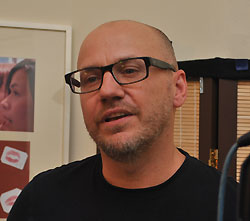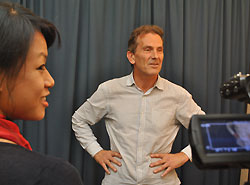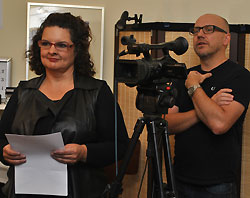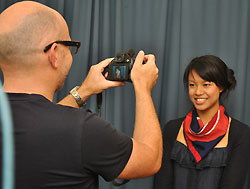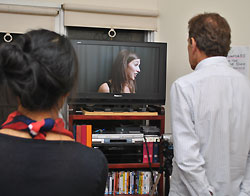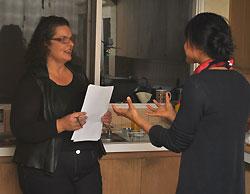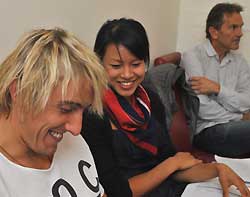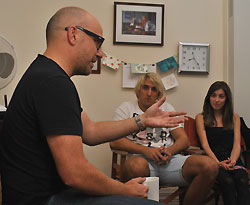Here is a list of the specific elements we examine over the duration of the course.
1 |
Using a verb or the character’s ‘NEED’ as a major tool for determining the NATURE OF PERSON you are playing. Other factors (such as pre-history/life experience) also contribute to a person’s nature but ‘NEED’ is a very efficient tool. (to stay complex it must be ‘separate from the text’) |
2
|
Identifying Story is an effective tool for determining a consistent path through a scene. The vast majority of scenes are one conversation. Having a clear goal to assess progress keeps listening and decision-making unified (as in life). Being able to change conversation goals significantly and quickly is a great tool for use in auditions and when taking direction on set. |
3
|
CIRCUMSTANCES AND RELATIONSHIPS provide many more options for understanding conversation goals and delivering dialogue than analyzing the meaning of the dialogue. |
| 4 |
SURPRISES - how they work and how to manage them. We explore their value and that we need to trust them. We can expand them with confidence because they are great storytelling tools. |
| 5 |
The CONVERSATION EXERCISE builds trust in never speaking without a reason. It encourages you to follow your simple understandings of what’s being said and what you want to say in response. It also builds an understanding that we can communicate a lot without using words. |
| 6 |
The REPETITION EXERCISE provides the opportunity to constantly find different impulses to drive your responses. It aids in building the skill to ‘step lines up’ so that every phrase is important and drives the story difficulty forward. |
| 7 |
LANDING ENDINGS is a simple Rehearsal Room technique that brings a practical perspective to ending a scene. Its aim is to free and empower the actor. |
| 8 |
We work on the story value of ‘keeping ENDINGS UP’ – dropping the ending of a line mostly brings an ambience of resolution and comfort (or diminishes importance). Keeping endings up generally drives the story difficulty forward. (Keeping endings up is also great for ‘laugh’ lines.) |
9 |
Considering OPPOSITES creates a more open approach to a scene and brings greater depth to listening. It makes the actor more flexible and more complex.. |
| 10 |
A DEFINITION OF TEXT makes it plain we don’t have to say ALL the dialogue or do all the big print (stage directions). |
| 11 |
A PRE-SHO0T PROCESS enables focus on the most practical forces the actor will follow through the scene. |
| 12 |
Putting ‘Hopes and Exptectations’ in place helps to make the actor like the character. |
| 13 |
We work on the basis that WHATEVER HAS HAPPENED IN ANY PERFORMANCE is now part of the scene – use it. Everything is real, don’t imagine things didn’t happen because they weren’t mentioned in the script. |
| 14 |
Defining the drama/story in a THREE HANDER and how to keep ‘need’ simple. |
| 15 |
All these processes are built on the belief (beautifully articulated by Glenn Quinn) - “I NEED TO PUT MYSELF, AT THE BEGINNING OF THE SCENE, IN THE SAME POSITION THAT THE CHARACTER IS IN, SO I CAN GO ON AND MAKE HIS DECISIONS FOR HIM” – that’s the ‘actors goal’. |

